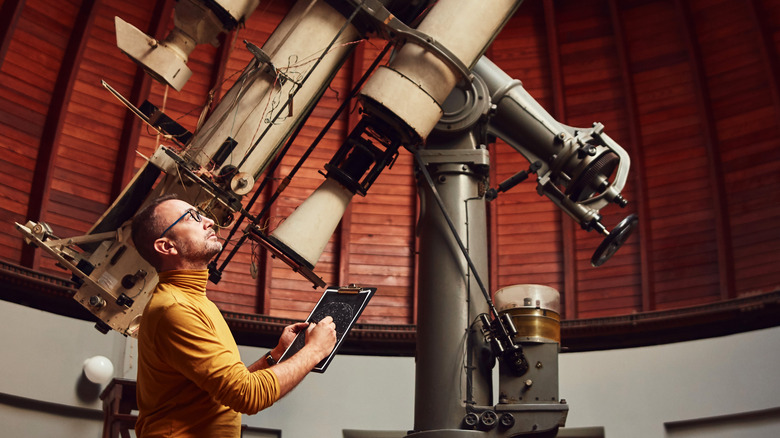The Average Income Of An Astronomer In The United States Might Surprise You
Humans have been fascinated with space for thousands of years. In ancient times, the stars helped people keep track of the seasons, enabled early mariners to navigate the seas, and inspired mythologies. More recently, astronomers have used telescopes and scientific discipline to figure out what lays beyond or how the universe works. Some have gone on to be famous. For example, astrophysicist Neil deGrasse Tyson has become a celebrity for explaining the latest scientific theories such as how life on Earth will end.
But the perk of being a professional astronomer isn't just the possibility of naming a newly discovered comets, becoming a footnote of history for a theory, or (maybe) discovering life on another planet. You can also make a very decent salary.
According to the U.S. Bureau of Labor and Statics, astronomers and physicists made a median salary of $166,290 a year as of 2024. For astronomers in particular, the median salary was just over $139,000, according to a report from Indeed.com.
Astronomy jobs are heading upward
While the typical astronomer salary is far less than the half-million-dollar salary the average cardiologist makes each year, this would be enough to live comfortably in the costliest states in the U.S. Plus, as an astronomer, you wouldn't have the same pressures of keeping people alive as cardiologists do. Although an astronomist may need to be wary about basing an important potential discovery on a miscalculation or an observational mistake, a subject that astronomer David Kipping explores in one of his Cool Worlds YouTube episodes.
Recent statistics suggest that astronomers are in demand. The growth rate for astronomers and physicists is 7%, a pace the Bureau of Labor and Statics says is faster than average. Besides working at advanced telescope facilities, astronomers teach at universities and work in government. Astronomers are welcome at tech firms, aerospace companies, and journalism outlets as well, depending on one's skill set.
Yet to become a top-earning professional astronomer, you'll need a master's degree in physical science. At the very least. Most top astronomers also have a doctorate in astronomy and physics, AAS added. And because astronomy is rooted in physics, a strong grasp of mathematics is required, although being good at math is important for all careers in science.
The cost of getting a stargazing education
So, if you want to earn a living unraveling the unsolved mysteries of space, you'll have to spend about 10 years in college, according to AAS. And that education will not come cheap. Due to soaring college costs, nearly 43 million people are saddled with student loan debt that averages at $38,375, according to a report from the Education Data Initiative. In total, student loan debt throughout the nation accumulated to nearly $1.8 trillion in 2024, the report added. With that in mind, finding a good scholarship will be important to help offset the cost of astronomical learning. Fortunately, CNBC recently came out with a list of websites that help find good scholarships.
You won't make much money in astronomy while attending college. A report from the American Institute of Physics stated that first-year teaching students in astronomy and physics made on average $27,800 a year in public universities and $36,000 annually at private colleges during the 2023-2024 academic year. As for fifth-year research assistants, their average salaries ranged from $30,500 to $38,100.
And how much you make as an astronomer depends on where you work. Another report from Indeed.com looked at where astronomers received the highest average salaries. The place where astronomy proved to be the most lucrative is the second most expensive state to reside in, Massachusetts, where the average annual salary was $167,590.


